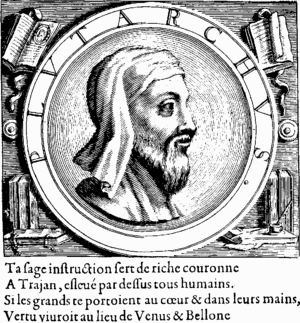Who was Plutarch?
Plutarch (Plutarxos) lived from 45 AD to 125 AD. He was Greek and wealthy by birth, receiving a superior education and throughout his life he was regarded as an eminent philosopher. He was known for being more accessible and down to eafth than most philosophers. Greece was by Plutarch’s time a Roman province and no longer a force in the world. He was, for much of his life, one of the two priests at the Temple of Apollo at Delphi, although late in his life he returned to his hometown of Cheronea where he was active in civic affairs and served as mayor. He wrote several books on philosophy which were well regarded during his life but he is best know for his biographic sketches of historic figures from Rome and Greece. In Lives he packaged a Greek and Roman together with a short essay comparing and highlighting their similarities and differences.
These are not classic biographies and Plutarch is eager to note that he is not trying for historical detail and completeness.
“It is not histories I am writing, but lives; and in the most glorious deeds there is not always an indication of virtue or vice, indeed a small thing like a phrase or a jest often makes a greater revelation of a character than battles where thousands die.”
Plutarch (Life of Alexander/Life of Julius Caesar, Parallel Lives, [tr. E.L. Bowie])
Rather he is highlighting the character of his subjects and using their strongest acts to emphasize his points. Lives was very popular during Plutarch’s life and widely read by Romans even though Plutarch wrote in Greek.
Rediscovered during the Renaissance
This work was rediscovered during the Renaissance and stimulated interest in the classics. Lives was popular for its practical wisdom but also became the inspiration for the Elizabethan age after translation in to English in 1579. Shakespeare borrowed heavily from Lives for his writings.
Lives was long considered essential reading for an educated person but in the 20th century as western civilization was rejected by the education establishment, Lives is less read and referenced.
Why we need Plutarch today.
Today, when character and principle is hard to find in business and government, Lives provides inspiration and example of individuals driven by strength of character and personal integrity. Plutarch is not afraid to make moral judgments about his subjects and writes with confidence that his readers are looking for role models and inspiration for their lives. Since morality has also been thrown under the bus these days, it is refreshing to read about men whose lives were framed by moral judgements. They can help us build our own moral compass in these confused times.
Check out one or two of the biographies and see what you have been missing.
It’s a big book full of names that most of us will not know although 200 years ago each of them were known by any educated individual and many not so educated ones. You may not be ready for the whole book but there is a wonderful way to get your feet wet at this website. You can pick two subjects that you know (or think you know) and learn what Plutarch has to say. If you decide to sample some of his lives, come back and share your opinion. Maybe you will be drawn to read them all.

